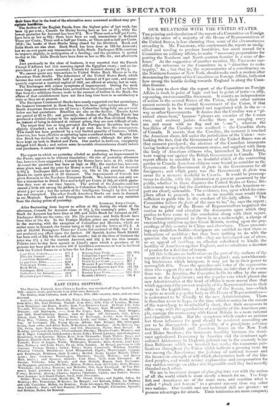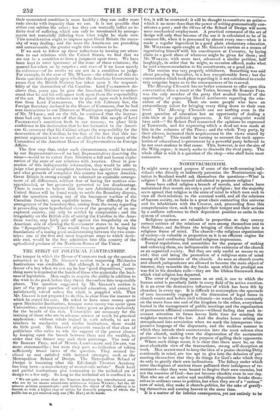TOPICS OF THE DAY.
OUR RELATIONS WITH THE UNITED STATES. THE printing and circulation of the report of a Committee on Foreign Affairs by order of a majority of the House of Representatives of the United States, is less alarming than some of the circumstances attending it. Mr. FILLNIORE, who condemned the report as undig- nified and tending to produce hostilities, has since moved for a Committee on military affairs, to make " necessary preparations for putting the Northern and North-eastern frontier in a state of de- fence." At the suggestion of another member, Mr. FILLMORE mo- dified the reference to the Cotninittee to a " direction to make inquiry," &c. ; but that he, the representative of a constituency on the Northern frontier of New York, should make such a motion after denouncing the report of the Committee on Foreign Affairs, indicates how strong the hostile feeling towards England is along the Cana- dian frontier.
It is easy to show that the report of the Committee on Foreign Affairs is weak hi point of logic and bad in point of taste—a silly, vapouring, unstatesmanlike document. It asserts an independence of action in the several States of the Union, which other nations cannot concede to the Central Government of the Union, if that Government is to be recognized and negotiated with in the same way as other Governments. It denies that the Caroline was a "pi- ratical steam-boat," because " pirates are enemies of the human race, and eminent jurists describe them as ravaging every sea and coast with no flag and no home" ; whereas the hostilities of the Caroline were confined t, the Canadian shore of Canada. It asserts that the Caroline, the moment it touched the American shore, fell under the jurisdiction of the Union : over- looking the fact, that the Government of the United States was at that moment paralyzed ; the abettors of the Canadian insurgents having broken open the Government stores, and supplied with them the body of American citizens who, intrenched in Navy Island, were waging war against the British Government in Canada. The report affects to consider it as doubtful which of the contending parties in Canada American citizens were bound to consider as the Government : the Government de facto is the Government for all foreigners ; and which party was the Government de facto was never for a moment doubtful in Canada. It would be presump- tuous to decide, with the information at present possessed by the public, whether in these disputes the United States or Great Bri- tain is most wrong; but the doctrines advanced in the American re- port are clearly untenable. The evidence, too, upon which its com- pilers affect to proceed, is such as no sensible man would think sufficient to guide him in the conduct of his daily affairs. "The Committee believe the facts of the case to be," &c. says the report ; but the majority of the House of Representatives negatived the motion to print and circulate the documents upon which they profess to have come to this conclusion along with their report. The Committee proceed to throw in as a makeweight, a charge of encroaching ambition against Great Britain, resting upon the pro- ceedings of this country in China and elsewhere. These proceed- ings are doubtless foolish—foreigners are entitled to view them as indications of ambition ; but they have nothing to do with the question the report deals with—they are introduced out of place, as an appeal ad ha:Miami, an allusion calculated to kindle the hostility of Americans against England, and to substitute a decision of passion for a decision of reason. All this indicates an inclination on the part of the authors of the report to drive matters to a war with England: and, notwithstand- ing hindrances which interpose, it. may yet be in their power to accomplish this. From the speeches and votes of the representa- tives who support the new Administration, we infer that it is averse from war. In America, the Executive holds its office by the same tenure as the Legislature ; and the popular vote which placed the new Administration at the head of affairs is more recent than that which appointed the present majority of the Representatives to their seats in the Legislature. A majority of the Senate, too—which is quite as much a popular body as the House of Representatives— is understood to be friendly to the new Administration. There is therefore room to hope, as the time which remains for the raisers of the war-whoop to do mischief is short, that their successors in office may, with the approbation of a majority of the American peo- ple, manage the controversy with Great Britain in a more rational and charitable spirit. ,But the symptoms which render us anxious lest these influences for good should be rendered unavailing are not to be disregarded : the possibility of a precipitate collision between the British and American forces on the New York and Maine frontiers ; the inveterate hostility between the domi- nant agricultural Democracy in America and the dominant agri- cultural Aristocracy in England, pointed out in the masterly letter from Baltimore which we inserted last week ; the numerous pub- lications throughout the Union which indicate a growing taste for war among the Americans ; the jealousy of national honour and the inveterate strength of will which characterize both of the kin- dred peoples, and would render explanation and compensation for any sudden outrage on either side impossible until they had soundly thrashed each other.
We are in imminent danger of plunging into war with the nation of all the world which is most nearly a match for us. The Eng- lish and Americans are of the same race, and combine what is called " pluck and bottom" to a greater amount than any other two nations. Our wealth and our technical skill arc greater : we possess advantages for attack. Their territories are more compact; their economical condition is more healthy ; they can suffer more rude shocks with impunity than we can. It is not possible that either can subdue the other ; but they can mutually inflict an in- finite deal of suffering, which can only be terminated by arrange- anents not materially differing from what might be made now. "This consideration ought to impress upon Great Britain the neces- sity of wary dealing; and the more the Americans are provoking . and unreasonable, the greater ought this wariness to be. If we seek to follow up these reflections by turning our atten- - tion to our relations with the United States, we find that we
are not in a condition to form a judgment upon them. We have been kept in utter ignorance of the state of these relations; the quarrel has taken us by surprise ; and even of it we know merely its existence—of its merits we are not in a condition to judge. For example, in the case of Mr. M‘Leon—the solution of this de- licate question depends upon whether the American Government is aware that the British Ministry has taken upon it the responsi- bility of the destruction of the Caroline. Lord PALMERSTON de- clares that, years ago, he gave the American Minister to under- stand that he and his colleagues took upon them the responsibility of the act. But little reliance can be placed upon such a declara- tion from Lord PALMERSTON. On the 8th February last, the Foreign Secretary declared in the House of Commons, that he had sent instructions to our Minister at Washington regarding the case of Mr. APLeon ; and on the 9th, he confessed that the instruc- tions had only been sent off that day. With this sample of Lord PALMERSTON'S assertions fresh in our memory, we place little confidence in his declaration that he has intimated to the Amen- can Government that his Cabinet adopts the responsibility for the destruction of the Caroline, in the face of the fact that this im- portant argument is not so much as alluded to in the report of the Committee of the American House of Representatives on Foreign Affairs.
The first step that, under such circumstances, would be taken . by our Representatives—if we had Representatives deserving the name—would be to extort from Ministers a full and honest expla- nation of the state of our relations with America. Once in pos- session of this indispensable information, they would be able to judge what grounds of complaint America has against this country, and what grounds of complaint this country has against America. Great Britain is strong enough to volunteer an equitable arrange- ment of all differences, without fear of having her motives mis- apprehended, or her generosity perverted to her disadvantage.
There is reason to believe that the new Administration of the United States will be found ready to settle the Boundary dispute, and the questions arising out of the buccaneer warfare of the Canadian frontier, upon equitable terms. The difficulty in the arrangement of the boundary-line, arising from the treaty regarding it proceeding upon hypothetical views of the geography of an un- explored country, can only be settled by compromise ; and the -irregularity on the British side of seizing the Caroline in the Ame- rican waters, may fairly pair off against the irregularity on the American side of allowing the Government stores to be used by the "Sympathizers." Time would thus be gained for laying the foundations of a lasting good understanding between the two coun- tries; one of the first and most important steps to which desir- able end, would be the free admission into this country of the agricultural produce of the Northern States of the Union.



























 Previous page
Previous page